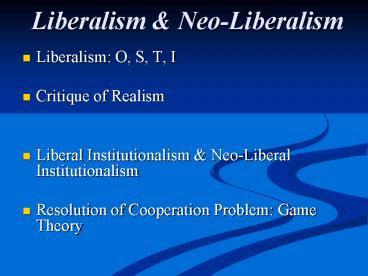Liberalism - PowerPoint PPT Presentation
1 / 27
Title:
Liberalism
Description:
Addresses relationship between practical political behavior and morality ... Kant acknowledges amorality and self-interest of politics ('political prudence' ... – PowerPoint PPT presentation
Number of Views:55
Avg rating:3.0/5.0
Title: Liberalism
1
Liberalism Neo-Liberalism
- Liberalism O, S, T, I
- Critique of Realism
- Liberal Institutionalism Neo-Liberal
Institutionalism - Resolution of Cooperation Problem Game Theory
2
Liberalism (O)
- Economic Liberalism (Smith, Ricardo)
- Political Liberalism (Locke)
- Perpetual Peace (Kant, Wilson)
- New critique of realism interwar era critique
(idealism), warfare unnecessary and outmoded way
of settling disputes
3
John Locke (1632-1704)
- Two Treaties of Government (1690)
- Political theory which would reconcile liberty of
citizen with political order - Against Hobbes, societies emerge from a state of
nature as a result of a contract made among
individuals to submit themselves to a rule - Right to life, liberty and property
4
Immanuel Kant (1724-1804)
- Enlightenment moralist
- Critique of Pure Reason (1781,1787)
- Addresses relationship between practical
political behavior and morality
5
Critique of Pure Reason
- Reminder Hobbes Machiavelli pay no attention
to moral qualities of sovereign - Kant acknowledges amorality and self-interest of
politics (political prudence) - But moral guiding must form a part of political
action
6
Kants Perpetual Peace
- Call for universal peace among nations as an
end-goal and rational idea, instead of
considering warfare as a given fact - Deterministic argument rational moral progress
7
Reminder Realism
- States are rational actors who use power to
maximize own short-term interests - Context anarchic system which lacks central
authority inherent insecurity - Power capabilities (mainly military) as leverages
in bargaining over outcomes
8
A Contemporary Liberal Critique of Realist
Assumptions
- Not full anarchy, evolution of order through
norms and institutions - States are not unitary actors with coherent
preferences - Rationality implies not to resort to war (costly)
but to forgo short-term individual interests for
long-term collective benefits
9
Critique of Realist Assumptions
- Alternative definition of Anarchy
- Alternative definition of Rationality
- Alternative definition of Power (not power over
others but power to accomplish mutual benefits)
10
Liberalism (S)
- Individual as primary unit of analysis
- Liberty of the individual (freedom)
- Economic interdependence leads to peace
- Primary objective improve human welfare mutual
benefit assumption - Focus free trade, democracy (democratic peace)
11
Liberalism (T)
- International system is hierarchic
- Actors will cooperate for common good -
cooperation is possible
12
Liberalism (I)
- International Institutions foster cooperation
resolve free rider problem - Rules and norms exist that govern behavior
13
Different Trends
- Liberal institutionalism
- Neo-liberal institutionalism
14
Liberal Institutionalism
- Focus on institutions and new actors
- Focus on new patterns of interaction (economic
interdependence, integration)
15
Neo-Liberal Institutionalism
- Focus on initiation and maintenance of
cooperation under conditions of anarchy - 1980s new liberal school with basic assumptions
close to neo-realism - Keohane, Oye, Young etc..
16
Neo-Liberal Institutionalism
- Cooperation is essential in a world of economic
interdependence, and shared economic interests
create a demand for international institutions
and rules. - R. Keohane, After Hegemony, Cooperation Discord
in the World Political Economy, 1984
17
Neo-Liberal Assumptions
- Institutions are mediators and means to achieve
cooperation - Multilateralism needed to secure national
interests and absolute gains in competitive - and anarchic IS
- Free trade and democracy as part of foreign
policy - States achieve superior type of rationality, i.e
with long-term self-interest
18
Cooperation under Anarchy
- Cooperation among egotists (Oye)
- Cooperation problem cheating or non-compliance
- What strategies can states adopt to foster the
emergence of cooperation?
19
Cooperation under Anarchy
- Benefits of mutual cooperation (CC) relative to
mutual defection (DD) benefits of unilateral
defection (DC) relative to unilateral cooperation
(CD) - For mutual benefits to exist, actors must prefer
unilateral defection (DC) to unilateral
cooperation (CD). - Cooperation desirable but not automatic
20
Neo-Liberals the Resolution of Cooperation
Problems
- Strategic interaction
- Game theory
- Political relationships are Positive-Sum (vs.
realists Zero-Sum games)
21
Zero-Sum Game
22
Positive-Sum Game
- (Prisoners Dilemma)
Prisoner C
Prisoner R
23
India Pakistans Arms Race
- (Prisoners Dilemma)
Pakistan
India
24
Strategies to Impact on Payoff Structures
- Subject to change through unilateral, bilateral
and multilateral strategies - Possible bilateral strategy issue-linkage
(combine dissimilar games)
25
Collaboration Problems
- Equilibrium outcomes are suboptimal defection is
dominant strategy (e.g, prisoners dilemma) - Cooperation unlikely in single-play
- Need to monitor and increase shadow of the
future.
26
Reciprocity as Solution to Anarchy
- Expectation of continued interaction iterated
environment (Oye, 1986) - Lengthening shadow of future
- Decompose interactions over time (Schelling,
1963 Axelrod, 1984) - Issue-Linkage cooperation on one issue
contingent on cooperation in a separate future
issue
27
Tit-for-Tat
- Conditional Cooperation Tit-for-Tat (Axelrod,
1984) - Strict reciprocity after initial cooperative move
in repeated PD game







![READ⚡[PDF]✔ Race and the Making of American Liberalism PowerPoint PPT Presentation](https://s3.amazonaws.com/images.powershow.com/10048489.th0.jpg?_=20240605116)























